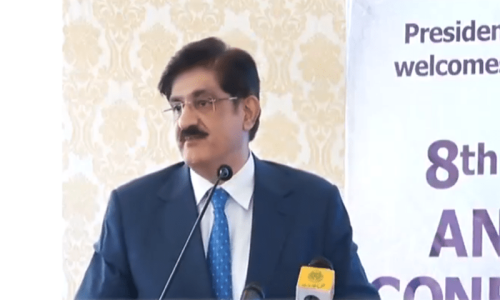KARACHI, Dec 25: The Centre of Excellence in Marine Biology (CEMB), University of Karachi, has undertaken a four-year multidimensional project that will help Pakistan explore its marine flora and fauna and develop expertise in marine aquaculture, so far an untapped potential that can help alleviate poverty in coastal communities, besides reducing pressure on depleting fish and shrimp resources.
The project, DelPHE (Development of Partnership in Higher Education), is funded by the Department of International Development (DFID), United Kingdom.
Dr Pirzada Jamal Siddiqui, an assistant professor of Marine Biology at the Centre, and DelPHE coordinator for Pakistan gave details of the project to Dawn in an interview. Prof Maruf Hossain, a former director of the Institute of Marine Science and Fisheries (IMSF), University of Chittagong, and DelPHE coordinator for Bangladesh was also present on the occasion.
Prof Siddiqui said that DelPHE was aimed at building institutional capacity in assessment and conservation of marine biodiversity with specific reference to corals and their associated ecosystems and development of aquaculture and fisheries technologies.
“The coast of Pakistan exhibited considerable diversity in terms of marine flora and fauna, including many commercially viable species. However, there has been a little research conducted so far on this subject and what has been done is mainly focused on the species found along the Sindh coast. The Balochistan coast has virtually been left out,” he observed.
He said this project provided an ideal opportunity not only to explore what had remained undocumented in the past, but also to develop expertise in aquaculture, especially marine aquaculture which was almost non-existent in the country.
“We have a wonderful chance to learn from experts working at the University of Sterling and University of London’s Marine Biological Station at Millport and the IMSF, University of Chittagong; which are our project partners. Sterling and Bangladesh are far ahead in terms of experience and expertise. In fact, Bangladeshis have been earning a fortune through aquaculture and have already developed innovative technology in collaboration with Sterling.”
Socio-economic uplift
These technologies will be more suitable for application in Pakistan as the climatic and socio-economic conditions of Pakistan and Bangladesh are similar,” Dr Siddiqui said. About the benefits, he pointed out that a sustainable aquaculture closer to coastal communities would not only provide food, but also generate job opportunities. Moreover, it would release pressure on the wild species which were being caught indiscriminately and many of which were near extinction, he said. A lack of trained manpower had remained the biggest hurdle in commercialising aquaculture, he observed.
Listing the achievements that have been made so far through the international links set up with the help of Higher Education Commission (HEC), he said that selected students and staff had been imparted training in coral reef survey methods, coral taxonomy, marine mammal biology, ecology and research and survey techniques.
“But the dream is to turn Karachi University into a national facility where manpower could be developed for marine aquaculture,” Dr Siddiqui remarked.
Gains in sight
Highlighting what Bangladesh is set to gain from DelPHE, Prof Maruf Hossain said the focus was on St. Martin’s Island, the only coral belonging island of the Bay of Bengal endowed with vast marine and land resources. “Under this project, we will be carrying out the first detailed study on the status of coral species and the various flora and fauna of this island, including dolphins, turtles and birds, with the help of UK team,” he said, adding that the data would later be shared with Pakistani counterparts who had already done some work on Astola island near Pasni.
About the present status of the Island, he said that unbridled human activity and construction had harmed the marine life, however, the process was being checked now by the government which had banned further construction.
“This happened because people didn’t have much awareness of the significance of corals and their ecological and economical value. In fact, corals had until recently been considered as mere rocks,” he said, emphasising that there was still a dire need for creating more awareness about these seemingly insignificant creatures.
“Coral reef ecosystems are vital for the survival of the world’s fisheries as they support enormous biodiversity and provide revenue to local communities. Thus, a research is being carried out around the world for their conservation,” he said. An integrated approach by creating a sense of belonging among locals over their natural resources is essential for a sustainable conservation, he stressed.
“Eco-tourism is being promoted throughout the world which requires pro-active support of government and involvement of local communities. People with a sense of ownership can well protect their natural resources, but they initially need monetary support and training for which the government has to take the first step,” Prof Maruf noted.—FI













































Dear visitor, the comments section is undergoing an overhaul and will return soon.